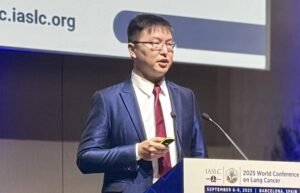Crizotinib is an approved treatment for advanced ALK-positive non-small cell lung cancer (NSCLC). However, its role in treating surgically resected early-stage NSCLC remains unclear.
The phase III ECOG-ACRIN E4512 trial evaluated whether postoperative crizotinib could improve disease-free survival (DFS) in patients with surgically resected ALK-positive NSCLC.
David Gerber, MD, Medical Oncologist at the UT Southwestern Harold C. Simmons Comprehensive Cancer Center, presented the findings during the first of two Presidential Symposia during the 2025 World Conference on Lung Cancer.

Presidential Symposium 1 with Lectureship Award Presentations
Registered WCLC 2025 attendees can watch David Gerber, MD, and other experts present recent research during the symposium with on-demand access. LEARN MORE
Trial Design and Enrollment
The E4512 trial compared crizotinib with observation in patients with surgically resected stage IIA to IIIB ALK-positive NSCLC who had not received neoadjuvant therapy; however, adjuvant chemotherapy or postoperative radiation therapy were allowed.
Participants received either 2 years of crizotinib treatment or observation. Stratification factors included disease stage, patient sex, and prior therapy.
The primary endpoint was DFS, while secondary endpoints included overall survival (OS) and safety. Although a local ALK-positive test result was sufficient for enrollment, DFS was analyzed only in cases confirmed as ALK-positive by central testing.
The study, conducted within the ALCHEMIST-Screen platform, enrolled 166 of a planned 168 patients; 154 of these were centrally confirmed as ALK-positive.
Enrollment ended in 2024 following FDA approval of adjuvant alectinib for resected ALK-positive NSCLC.
Two-thirds of patients were women, and approximately three-quarters of those enrolled identified as non-Hispanic white, with less than 10% identifying as Asian. More than half of the patients (60%) reported no history of smoking.
Stage III cases outnumbered stage II cases in both treatment arms. Nearly 85% of patients underwent lobectomy, and 70% had either a complete mediastinal lymph node dissection (MLND) or systematic lymph node sampling. Almost all participants (90%) received adjuvant chemotherapy, and one-third underwent postoperative radiation therapy.
Results
At a median follow-up of 58.3 months, there was no significant difference in DFS between the crizotinib and observation groups. The median DFS was 72.8 months in the crizotinib arm versus 75.1 months in the observation arm (hazard ratio [HR] 1.06; 90% confidence interval [CI]: 0.63–1.77; p = 0.86).
Dr. Gerber noted that no DFS difference was observed across stratification groups. There were also no clinically meaningful differences in OS, though the data were immature (HR 0.49; 90% CI: 0.18–1.37; p = 0.26).
Treatment-related adverse events (TRAEs) of grade 3 or higher occurred in 43% of patients receiving crizotinib. Apart from one grade 4 stroke, all TRAEs were grade 3, and crizotinib’s toxicity profile was consistent with that of advanced disease. The most common TRAEs included:
- Diarrhea
- Edema
- Eye disorders
- Abdominal pain
- Elevated ALT
- Decreased neutrophil count
The median treatment duration of crizotinib was 13.5 months. Forty percent of patients completed the full 2-year course, while 27% discontinued early due to adverse events.
Other reasons for treatment discontinuation included patient withdrawal or refusal (14%), disease recurrence (5%), and initiation of other treatments (4%).
Future Implications
The E4512 findings don’t change clinical practice, as adjuvant alectinib remains the standard treatment for ALK-positive NSCLC in countries where it’s accessible. Jessica J. Lin, MD, who was the discussant for the presentation, said the trial results provide evidence against adjuvant crizotinib and instead support efforts to broaden access to alectinib.
To address the lack of a DFS benefit, Dr. Lin, Director of Precision Medicine in Thoracic Oncology, Mass General Brigham, and associate professor of medicine, Harvard Medical School, noted key differences between crizotinib and alectinib. “Crizotinib is a first-generation TKI that is multi-targeted, whereas alectinib, a second-generation TKI, is more selective in the metastatic setting,” Dr. Lin said.
Dr. Lin further explained that alectinib has established central nervous system (CNS) activity in patients, while crizotinib achieves only modest CNS activity. This difference in potency could have an important bearing on the level of benefit that can be derived from adjuvant TKI use.
“TKIs that are potent with strong efficacy should be prioritized for evaluation in the adjuvant setting,” Dr. Lin said. “As always, the tolerability of these targeted therapies is another pivotal consideration.”
Ultimately, the E4512 findings still provide valuable insights by showing what does not work, reinforcing that not all therapies effective in the metastatic setting are suitable for adjuvant use. The outcome also highlights the importance of selecting the right treatment, especially as researchers consider adjuvant targeted therapies for patients with specific genomic alterations.
“Biomarker testing in early-stage lung cancer, including for ALK rearrangement, remains imperative,” said Dr. Lin. “Continued research is critical as we continue our efforts to optimize adjuvant targeted therapy approaches.”










